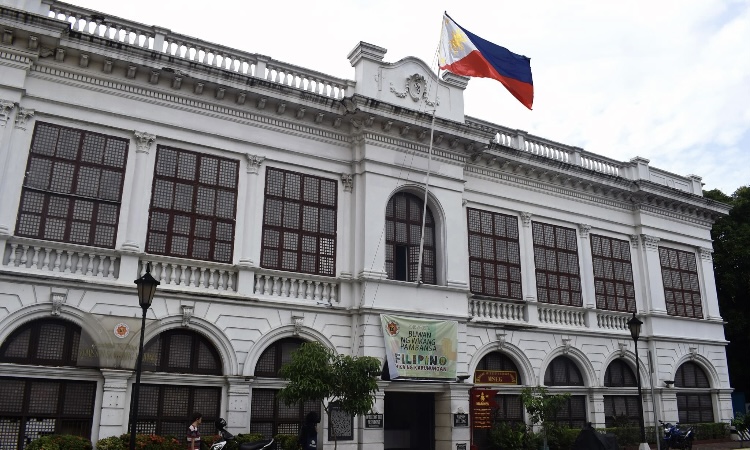The Komisyon sa Wikang Filipino (KWF) recent ordered the banning of five books in libraries and schools deemed “political” and “subversive” for containing
“anti-government” texts.
According to the memorandum of the country’s official language commission that issued on 9 August, these books may contain texts that could be “inciting to commit terrorism,” a violation of the Anti-Terrorism Law’s Article 9, thus its order to cease the distribution of the books.
On the same day, National Task Force to End Local Communist Armed Conflict (NTF-ELCAC) spokesperson Lorraine Badoy showed portions of the books during a show at Sonshine Media Network.
“Kagyat na iniaatas ang tuluyang PAGPAPATIGIL sa lahat ng aklat na may nilalamang politikal, subersibo, at mga malikhaing akdang may subliminal na ideolohiyang nanghihimok at/o nakapag-uudyok na labanan ang pamahalaan at sa lahat na kauring tekstong inilimbag at/o ililimbag kasama ang nasa imprenta o pangangalaga ng yunit ng publikasyon ng Komisyon,” the memorandum.
The memo was signed by Carmelita C. Abdurahman, KWF’s Commissioner for Programs and Projects, and Benjamin M. Mendillo, Commissioner for Finance and Administration.
The books are Teatro Politikal Dos by Malou Jacob, Kalatas: Mga Kuwentong Bayan at Kuwentong Buhay by Rommel B. Rodriguez, May Hadlang ang Umaga by Don Pagusara, Labas: Mga Palabas sa Labas ng Sentro by Reuel M. Aguila, and a published research of Dexter Cayanes titled Tawid-diwa sa Pananagisag ni Bienvenido Lumbera: Ang Bayan, ang Manunulat, at ang Magasing Sagisag sa Imahinatibong Yugto ng Batas Militar 1975-1979.
Cayanes’ research is about the literary works of National Artist Bienvenido Lumbera during Martial Law. The works of Jacob, Rodriguez, and Pagusara were all formally published by the KWF.
In line with the month-long annual observance of “Buwan ng Wika’’ in the Philippines held every August to promote the national language, Filipino, several teachers, professors, and students expressed their frustration on social media over KWF’s action.
“What evidence do they have to say these books are anti-government and subversive? This is censorship of free speech,” Assoc. Prof. Peter Julian Cayton from the University of the Philippines-Diliman posted on Twitter.
“The chilling effect of the Anti-Terrorism Law. Instead of focusing on strengthening the nation’s collective memory through the promotion of our local books and intellectualizing the Filipino language, this is what they do: banning books that tell conditions, stories of society,” Jelo Mantaring, a UST Journalism graduate, said.
Prof. Joey Baquiran, director of the UP’s Institute for Creative Writing, told Daily Tribune: “Red tagging authors because of alleged anti-establishment views smacks of censorship and undemocratic treatment of our intellectuals. Freedom of expression is one of the basic human rights enshrined in our Constitution and such mindless trampling of this right must be denounced outright as uncivilized and unwarranted.”
Meanwhile, online user Carlos Manlapaz contradicted the effect of the memorandum and said that “students in most public schools rarely read books from their bags, let alone books from their schools. This won’t affect them that much. Better yet, creators must make features using themes from these books na lang. That’s what students usually consume already,”
Many netizens have also commented that the ban is only increasing the public’s curiosity to look for these books that have been marked as “those literary publications are covered by academic freedom and freedom of speech. Thus, this nation and its citizens, now more than ever, need more books or libraries and neither guns nor troll farms.”
Recently, the Book Development Association of the Philippines (BDAP) also underscored that “books are not just essential to a democratic society, but are a mover for our knowledge economy.”
